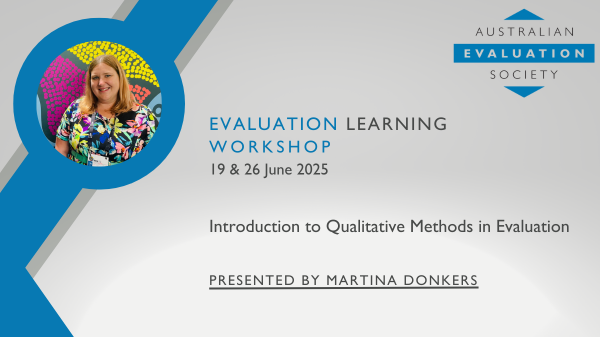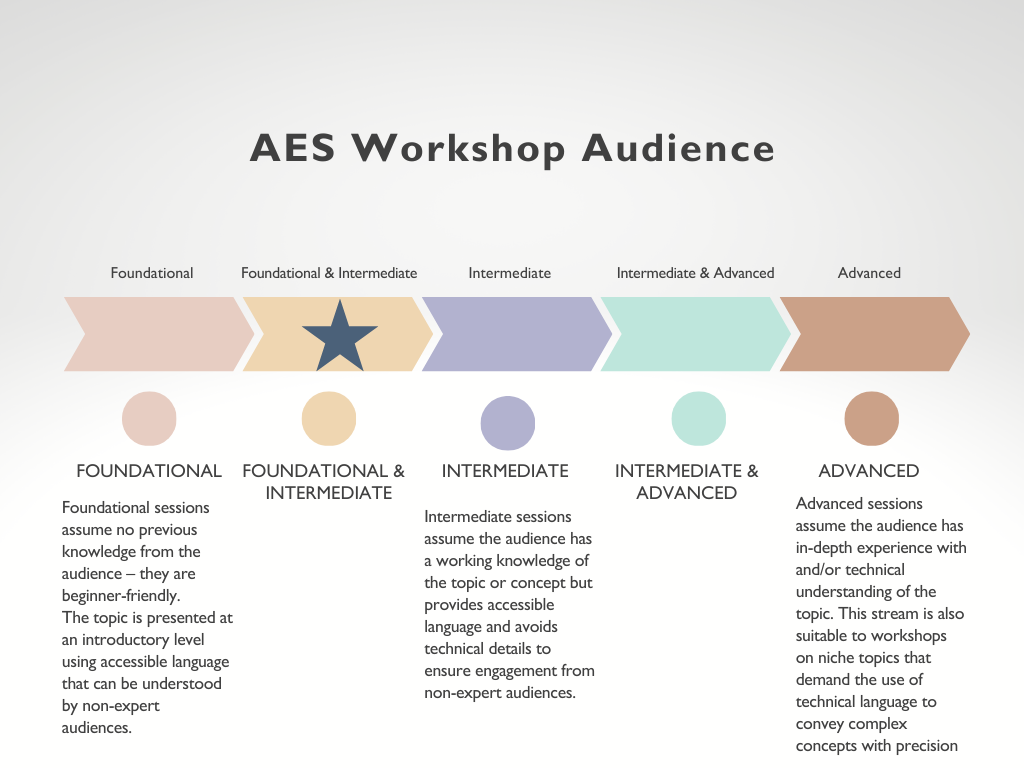Workshop: Introduction to Qualitative Methods in Evaluation (Online 19 & 26 June 2025)

Workshop: Introduction to Qualitative Methods in Evaluation
Date and time: Thursday 19 June and Thursday 26 June 2025, 10.00am to 1.00pm AEST (registration from 9.45am) Registrants are to attend both sessions. (full day workshop - 2 sessions)
Venue: Via Zoom. Details will be emailed to registrants just prior to the workshop start time
Facilitator: Martina Donkers
Register online by: 18 June 2025. Spaces limited to 25 participants
Fees (GST inclusive): Members $325.00, AES Organisational member staff $460.00, Non-members $535.00, Student member $155.00, Student non-member $250.00* (GST inclusive) *Students must send proof of their full-time student status to
Purpose of Workshop
Qualitative methods are frequently used across evaluation in all sectors, from simple feedback forms to large focus groups and complex case studies. But too often, we see qualitative methods used without fully understanding why – which methods we should choose, how they support the purpose of the project, and what choices we have within each of those methods to tailor it. The result is often evaluation design that doesn’t enable us to draw evaluative conclusions, survey respondents and interviewees who feel frustrated, and more confusion than when we started. Most people are familiar with terms like survey and interview, but few people have any basic training in qualitative methods – when and why to do them, how to do them well, and when to avoid them. Done well, qualitative methods yield rich insights that can shift the needle on projects. Done badly, qualitative methods frustrate stakeholders and project teams alike.
This workshop delivers an accessible, practical overview of qualitative methods and how to use them in evaluation. We cover the range of options, when to choose different methods, and practical ways to collect and analyse qualitative data that lets you draw evaluative conclusions. Qualitative methods is a big topic, and we’re going for breadth rather than depth in this workshop, helping you to understand what kinds of things you need to consider as you’re designing and planning your qualitative evaluation. The workshop is designed for anyone who wants to feel confident in designing, carrying out and analysing qualitative surveys, interviews and focus groups – especially those who are doing so in the near future.
Workshop Content
A practical overview of using qualitative methods in evaluation, including:
• What do we mean by qualitative methods
• Different options, and when to choose them
• Designing high-quality qualitative evaluations – sampling, validity, rigour, ethics
• Planning qualitative data collection
• Considerations in analysing and reporting qualitative data
• Drawing evaluation conclusions.
Workshop Outcomes
At the conclusion of the course, participants will be able to:
• Identify the core qualitative methods and their features
• Link their choices in research design to their evaluation objectives and context
• Identify key considerations in sampling, validity, rigour and ethics pertaining to qualitative methods
• Prepare simple qualitative data collection tools
• Identify issues and strategies for qualitative data analysis
• Connect choices in qualitative reporting to purpose and audience.
PL competencies
This workshop aligns with competencies in the AES Evaluator’s Professional Learning Competency Framework. The identified domains are:
-
Domain 1 – Evaluative attitude and professional practice
-
Domain 2 – Evaluation theory
-
Domain 3 – Culture, stakeholders and context
-
Domain 4 – Research methods and systematic inquiry
Who should attend?
This workshop is for anyone who feels like they might have missed some of the basics on qualitative methods, and wants to feel more confident – especially if they are carrying out a small qualitative evaluation in the near future. It is beginner friendly, covers a wide breadth of issues and ideas, and is suitable for people who have recently come from another discipline, including quantitative researchers. There are no prerequisites.

Workshop start times
-
VIC, NSW, ACT, TAS, QLD: 10.00pm
-
SA, NT: 9.30am
-
WA: 8.00am
-
New Zealand: 12.00pm
For other time zones please go to https://www.timeanddate.com/worldclock/converter.html
About the facilitator
Martina Donkers is an independent evaluator and consultant working with non-profits and governments to understand and increase their impact. She holds a Master of Evaluation (hons) and a B.A./B.Sci. (science communication), and uses a variety of qualitative methods to evaluate very large complex projects, and small straightforward projects. She's a strong believer in helping people to get the info they need to make the right decisions for their work, and understanding the role of context and purpose in driving those decisions. Martina is known for her ability to explain ideas in ways that make sense – she loves a good analogy, and creates an approachable, relaxed adult learning environment. Martina won the AES Emerging New Talent Award in 2024. You can connect with Martina at www.martinadonkers.com, or on LinkedIn.
Event Information
| Event Date | 19 Jun 2025 10:00am |
| Event End Date | 26 Jun 2025 1:00pm |
| Cut Off Date | 18 Jun 2025 4:00pm |
| Location | Zoom |
| Categories | Online Workshops |
